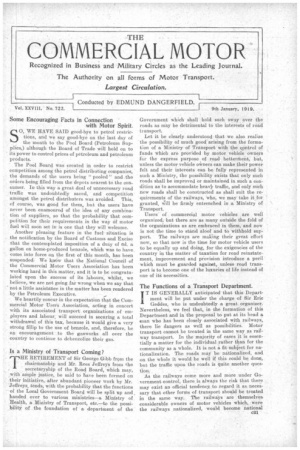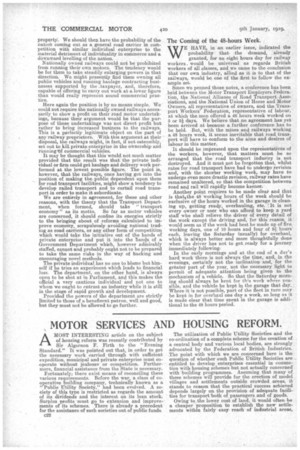Some Encouraging Facts in Connection
Page 1

Page 2

If you've noticed an error in this article please click here to report it so we can fix it.
with Motor Spirit
S0, WE HAVE SAID good-bye to petrol restrictions, and we say good-bye on the last day of the month to the Pool Board (Petroleum Sup-. plies,) although the Board of Trade will hold on to its power to control prices of petroleum and petroleum products.
The Pool Board was created in order to restrict competition among the petrol distributing companies, the demands of the users being "pooled" and the orders being filled from the depots nearest to the consumer. Inthis way a great deal of unnecessary road traffic was undoubtedly saved, and competition amongst the petrol distributers was avoided. This, of course, was good for them, but the users have never been enamoured of the idea of any combination of suppliers, so that the probability that ownpetition for their requirements in the way of motor fuel will soon set in is one that they will welcome.
Another pleasing feature in the fuel situation is the notification by the Board of Customs and Excise that the contemplated imposition of a duty of 6d. a gallon on home-produced benzole, which was to have come into force on the first of this month, has been suspended. We know that the National Council of the Commercial Motor Users Association has been working hard in this matter, and it is to be congratulated upon the success of its labours, whilst, we believe, we are not going far wrong when we say that ' not a little assistance in the matter has been rendered by the Petroleum Executive.
We heartily concur in the expectation that the Commercial Motor Users Association, acting in concert with its associated transport organizations of employers and labour, will succeed in securing a total withdrawal of this tax, because it would give a very strong fillip to the use of benzole, and, therefore, be an encouragement to the gasworks all over the country to continue to debenzolize their gas.
Is a Ministry of Transport Coming?
. HE RETIREMENT of Sir George Gibb frem the chairmanship and Mr. Rees Jeffreys from the secretaryship of the Road Board, which may, with ample justice, be said to have been formed on their initiative, after abundant pioneer work by Mr. Jeffreys, tends, with the probability that the functions of the Local Government Board will he split up and handed over to various ministries—a Ministry of Health, a Ministry of Transport, etc.—to the possibility of the foundation of • a department of the Government which shall bold such sway over the roads as may be detrimental to the interests of road transport.
Let it be clearly understood that we also realize the possibility of much good arising from the formation of a Ministry of Transport with the control of funds which are provided by motor vehicle owners for the express purpose of road betterment, but, unless the motor vehicle ca`vners can make their power felt and their interests can be fully represented in such a Ministry, the possibility exists that only such roads shall be improved or maintained in such a condition as to accommodate heavy traffic, and only such new roads shall be constructed as shall suit the requirements of the railways, who, we may take it_for granted, sill be firmly entrenched in a Ministry of Transport.
Users of commercial motor vehicles are well organized, but there are as many outside the fold of the organizations as are embraced in them, and now is not the time to stand aloof and to withhold support. The railways are making their great effort now, so that now is the time for motor vehicle users to be equally up and doing, for the exigencies of the country in the matter of taxation for road reinstatement, improvement and provision introduce a peril which must be guarded against, unless road transport is to become one of the luxuries of life instead of one of its necessities.
The Functions of a Transport Department.
IT IS GENERALLY anticipated that this Department will be put under the charge of Sir Eric Geddes, who is undoubtedly a great organizer. Nevertheless, we feel that, in the formation of this Department and in the proposal to put at its head a man who has been closely associated with railways, there lie dangers as well as possibilities. Motor transport cannot be treated in the same way as railway transport. In the majority of cases it is essentially a matter for the individual rather than for the community as a whole. It is not a fit subject for nationalization. The roads may be nationalized, and on the whole it would be well if this could be done, but the traffic upon the roads is quite another clues, Eon. As the railways come more and more under Government control, there is always the risk that there may exist an official tendency, to regard it as necessary that other forms of transport should be treated in the same way. The railways are themselves considerable owners of motor vehicles which, were the railways nationalized, would become national property. We should then have the probability of the nation coming out as a general road carrier in competition with similar individual enterprise to the material detriment of individuality in commerce and a downward levelling of the nation. Nationally owned railways could not be prohibited from running their own motors. The tendency would be for them to take steadily enlarging powers in that direction. We might presently find them owning all public vehicles and running haulage contracting businesses supported by the -taxpayer, and, therefore, capable of offering to carry out work at a lower figure than would really represent sound commercial practice.
Here again the position is by no means simple. We could not require the nationally owned railways necessarily to show a profit on their road motor undertakings, because their argument would be that the purpose of these undertakings was not direct profit but rather to bring increased business to the railways. This is a perfectly legitimate object on the part of any railway proprietors. With this argument at their disposal, the railways might, in feet, if not ostensibly, set out to kill private enterprise in the ownership and runningief commercial vehicles. It may be thought that this would not much matter provided that the result was that the private individual or firm could get haulage and delivery work performed at the lowest possible figure. The point is, however, that the railways, once having got into the position of making the. public dependent upon them for road transport facilities, might shows tendency to develop railed transport and to curtail road transport in order to make it subordinate.
We are entirely in agreement, for these and other reasons, with the theory that the Transport Department, when formed, should take "transport economy" as its motto. So far as motor vehicles are concerned, it should confine its energies strictly to the bringing about of reforms calculated to improve economy, scrupulously avoiding national trading as road carriers, or any other form of competition which would take the initiative out of the hands of private enterprise and put it into the hands of a Government Department which, however admirably staffed, cannot and probably ought not to be prepared to take the same risks. in the way' of backing and encouraging novel methods. The private individual has no one to blame but himself if he tries an experiment which leads to financial loss. The department, on the other hand, is always open to be shot at in Parliament, and this makes the official a very cautious individual and not one to whom we ought to entrust an industry while it is still in the stage of rapid growth and development.
Provided the powers of the department are strictly limited to those of a beneficent patron, well and good, but they must not be allowed to go further.
The Coming of the 48-hours Week.
WE HAVE, in an earlier issue, indicated the probability that the demand, already granted, for an eight hours day for railway workers. would be universal as regards British workers of all classes, and we came to the conclusion that our own industry, allied as it is to that of the railways, would be one of the first to follow the example set.
Since we penned those notes, a conference has been held between the Motor Transport Employers Federation,, the National Alliance of Road Transport Associations, and the National Union of Horse and Motor Owners, all representative of owners, and the Transport Workers' Federation, representative of labour, at which the men offered a 48 hours week worked on 5 or 5i. days. We believe that no agreement has yet been arrived at because a further conference has to be held. But, with the mines and railways working a 48 hours week, it seems inevitable that road tran.sport will have to conform to the aims and desires of
labour in this matter. . . It should be impressed upon the representatives of the workers, however, that matters must be so arranged that the road transport industry is not destroyed. And it must not be forgotten that, whilst rates for road transport have had to undergo revision and, with the shorter working week, may have to undergo even more drastic revision, railway rates have remained unaltered, so that the competition between road and rail will rapidly become keener.
Another point reciuiree to be made clear and that is that the48 working hours of the week should be exclusive of the hours worked in the garage in cleaning up, getting ready, overhauling, etc. It is not every owner or user who can afford to keep a yard staff who shall relieve the driver of every de-tail of the work except the driving and, for this reason it would seem as if the week had best be made up of Ave working days, one of 10 hours and four of el hours each, leaving the Saturday (usually) for overhaul, which is always better and more thoughtfully done when the driver has not to get ready for a journey immediately following.
In the early mornings and at the end of a dav's hard work there is not always the time, and, in the evenings, certainly not the inclination and, for the greater part of the year, not the necessary light to permit of adequate attention being given to the mechanism of a vehicle. So that the Saturday morning should always be kept for th;s work where possible, and the vehicle be kept in the garage that day. Where it is not possible, part of the fleet in turn rnay be kept in for overhaul one day a week, so long as it is made clear that time spent in the garage is additional to the 49 hours period.






















